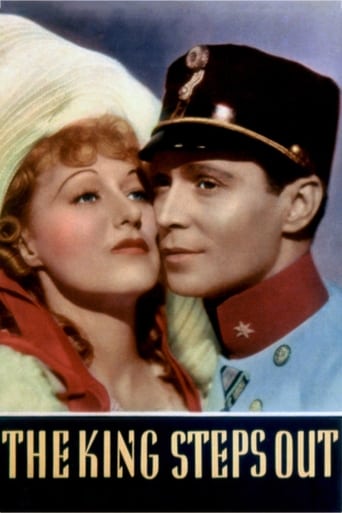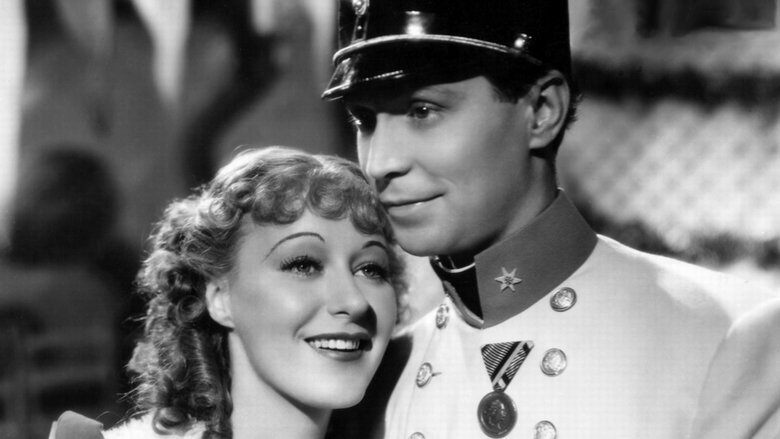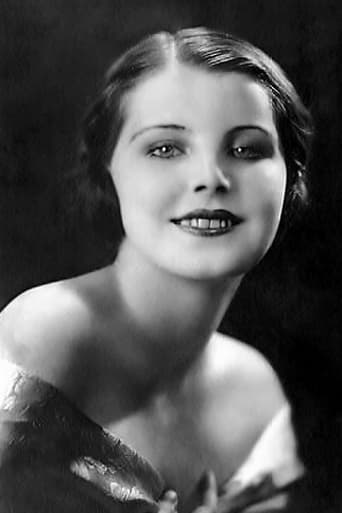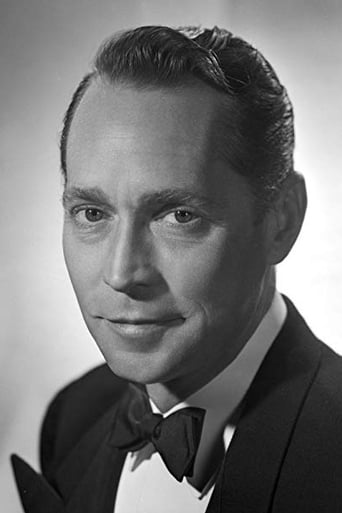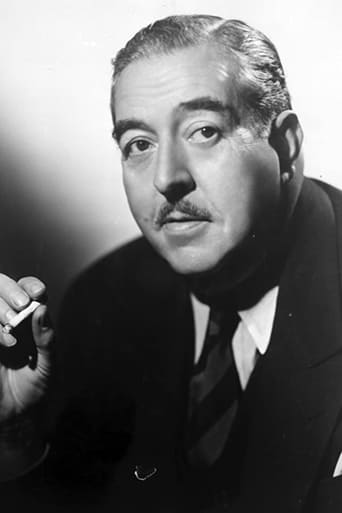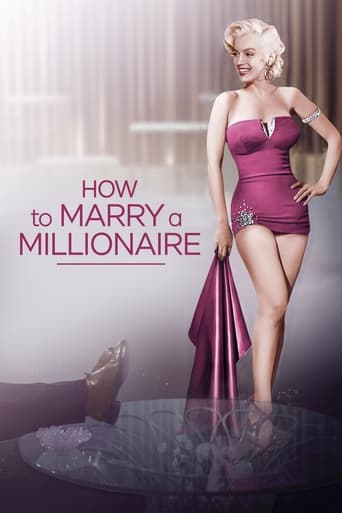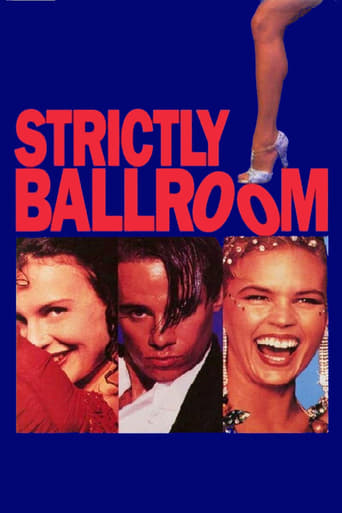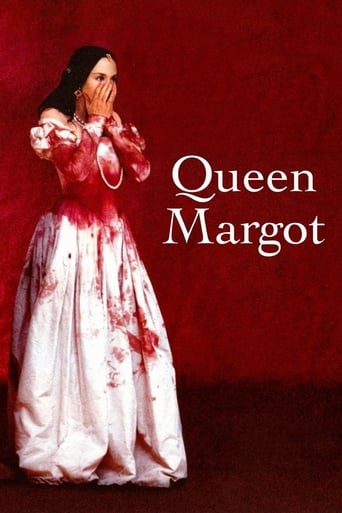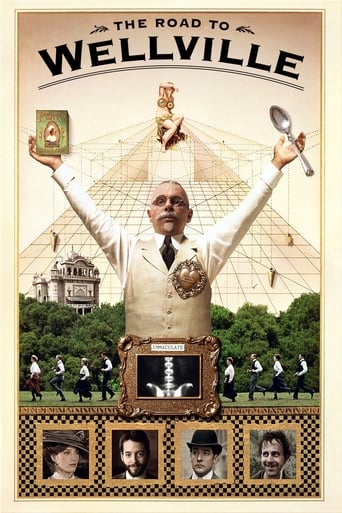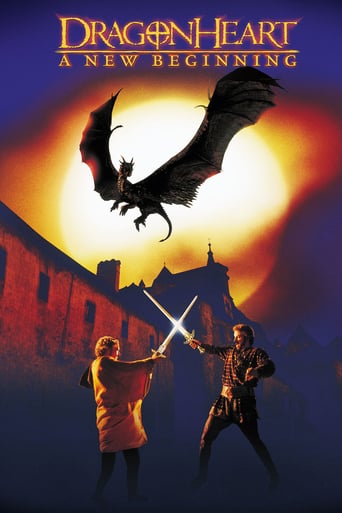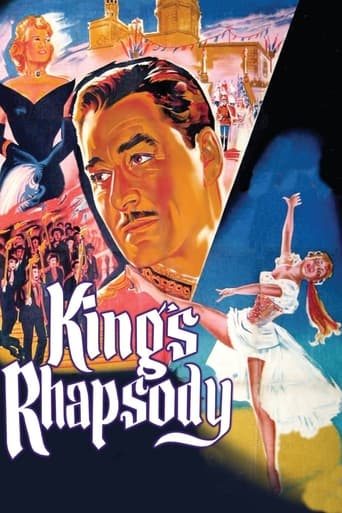The King Steps Out (1936)
Princess is destined to marry the Emperor, until her sister steps in.
Watch Trailer
Free Trial Channels
Cast


Similar titles
Reviews
One of my all time favorites.
Did you people see the same film I saw?
Best movie ever!
Fanciful, disturbing, and wildly original, it announces the arrival of a fresh, bold voice in American cinema.
SPOILERS *** Not sure why they called this "King Steps Out"... the leader of this burg seems to be Emporer Franz Josef, played by Franchot Tone. There are dukes, duchesses, princesses, colonels and captains, but no kings. Walter Connolly, known for his comedy is the duke of bavaria. Franchot Tone is the Emporer, and has the guards bring up "Cissy", the girl picking flowers. (Grace Moore) She keeps busting out into song. Yawn. This one would have been better if they jazzed up the script and left out the songs completely. Mistaken identities, silly inn-keepers, interfering parents, and suddenly they're in love. A couple twists, here and there. Its OK. Directed by Josef von Sternberg, who apparently had a reputation as a real jerk, acc to various sources. An interesting tale where Charlie Chaplin burned one of Sternbergs films, since it came out so terrible. Wikipedia has a whole entry on "Woman_of_the_Sea"... sadly, the film seems to be lost to time. When you watch this one, mute the operatic numbers and just enjoy the show.
I've always liked Grace Moore in movies, though I'm not quite sure why. She wasn't the greatest singer, and she had some annoying vocal mannerisms. But she certainly sang with enthusiasm, and that is probably what I've enjoyed about her film appearances.Sometimes, as in her first success, One Night of Love, the singing was spirited but her delivery of dialog often stilted. That's not the case in this movie. She really comes across most often as very comfortable and natural, qualities that her co-star, Franchot Tone, had in spades. That, I think, is what makes this movie work for me. They are very good in their scenes together, very believable.What remains a problem for me is the musical aspect of this movie. Others have complained that the songs aren't memorable. For me some are, like The Old Refrain, others not. But the big problem, for me, is that all the musical numbers, with the exception of one march, are vocal solos for Moore. (The march is sung by a men's chorus with Moore singing over them.) Because none of the other characters ever join in the singing, the musical numbers seem isolated from the rest of the picture, and it comes off less as a musical than as a romantic comedy with inserted songs. If you contrast it with a Jeannette MacDonald/Nelson Eddy or Maurice Chevalier picture from the same era, you see the difference.The plot, as Viennese operettas go, isn't bad. The supporting actors are all good, though I agree that a little of Herman Bing goes a long way, and there is more than a little of him here.All in all, an agreeable romantic comedy, with inserted songs that don't do anything to advance the story and could, indeed, be cut out without any loss in most cases.
Supporting players Walter Connolly and Elizabeth Risdon steal the show with their portrayals in this 1936 comedy.Lovely to watch Grace Moore in a real flighty role for her; a sister who goes with her father to break up the forthcoming nuptials of her sister, Frieda Inescort to Emperor Franchot Tone. Naturally, we can go who falls in love with whom. Moore sings to the right notes and we have some very humorous moments at the carnival honoring the Emperor's birthday.A delightful comedy with a superior cast. The typical 1930s comedy with the odd twists.
One of the truisms of Hollywood was that Josef Von Sternberg lost his muse when he and Marlene Dietrich parted creative company after The Devil Is A Woman. With Crime and Punishment between them, this next film is considered to be the biggest flop in his career. Mainly because Von Sternberg took on a light and airy Viennese operetta, the kind he probably grew up on in Europe.I don't think the film flopped because it was so bad, it's dated, but other operettas and more well known ones date even more. However The King Steps Out made a mistake because too many people remembered Emperor Franz Joseph of Austria-Hungary for good and for ill him dying exactly 20 years earlier. And about 20 years earlier his wife Empress Elizabeth also died and she was also remembered by a few.What people remembered that beneath all this Viennese schmaltz, this was a story that did not have a happy ending. What we see in the film concerning Franz Josef and Elizabeth of Bavaria is true as far as it goes. It was a whirlwind courtship of sorts and the young Emperor did wind up marrying the younger sister after the Dowager Empress his mother arranged for the older sister. In real life though after the honeymoon and Elizabeth presenting the Hapsburg Emperor with a son and seemingly settling the succession, the woman would not settle down. When you see the vivacious Elizabeth that Grace Moore gives us on the screen, that was the real Sissi. She would not settle down though and eventually the couple split and lived apart for the rest of their lives with Elizabeth leading a gay and carefree life at the various resorts and spas of 19th century Europe. She was assassinated by an anarchist. The reaction to her death was very much like that for Princess Diana, in fact there are a lot of parallels between Lady Diana Spencer and Elizabeth of Bavaria.The image we have of Franz Joseph is that solemn man with the muttonchop whiskers and a stern countenance, the father of his people. Franz Joseph was always in fact a serious minded man. The character that Franchot Tone gives us just isn't the case, he was hardly that charming in real life. The Emperor certainly did get his battery plenty charged when Sissi was around and they were young and in love.Grace Moore of course is in fine voice in the third of her films for Columbia and the first that didn't quite measure up to Harry Cohn's expectations. The score was written by violin virtuoso Fritz Kreisler and Dorothy Fields and two of the songs Stars In My Eyes and The Old Refrain became concert standards for Grace Moore. Harry Cohn gave Von Sternberg a wonderful cast of known supporting players to work with. Out of the group I liked Herman Bing, the only authentic German in the bunch. He gets a lot of laughs out of playing the flustered innkeeper whom everyone, royalty included, takes advantage of.No happily ever after endings for Franz Joseph and Sissi and sad to say the audience knew it.

